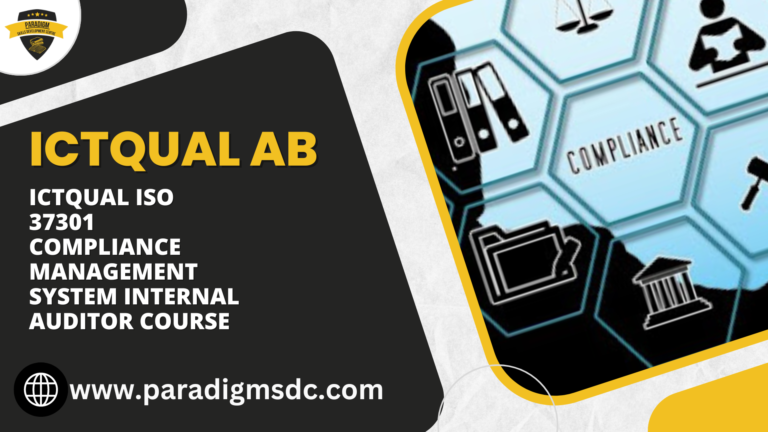Course Introduction
The ICTQual Level 8 Professional Diploma in Qualification Development and Delivery is an advanced program tailored for seasoned professionals in the education and training sectors. This course focuses on the strategic and operational aspects of qualification design, development, and delivery, ensuring that graduates can create impactful, relevant, and high-quality educational programs.
Course Overview
This comprehensive diploma spans over 12 months, combining theoretical knowledge with practical application. The curriculum is structured to cover a broad spectrum of topics, from curriculum design to assessment methodologies, ensuring a holistic understanding of the qualification development process. The course is delivered through a blend of online modules, workshops, and project-based assignments, providing flexibility and practical experience.
Course Study Units
Study Unit 1: Foundations of Qualification Development
- Introduction to Qualification Frameworks:
- Explore the concept of qualification frameworks and their role in education and training systems.
- Analyze different types of qualification frameworks, including national, regional, and international frameworks.
- Understand the principles of alignment, progression, and recognition within qualification frameworks.
- Curriculum Design and Development:
- Examine principles and models of curriculum design, including competency-based and outcomes-based approaches.
- Learn methods for identifying learning outcomes, designing learning activities, and assessing student achievement.
- Explore strategies for curriculum review, renewal, and continuous improvement.
Study Unit 2: Assessment and Evaluation Strategies
- Assessment Design and Development:
- Study various assessment methods and techniques, including formative and summative assessment, authentic assessment, and criterion-referenced assessment.
- Explore principles of validity, reliability, fairness, and transparency in assessment design.
- Learn to develop assessment tasks and rubrics aligned with learning outcomes and curriculum objectives.
- Evaluation of Learning and Teaching:
- Understand the role of evaluation in monitoring and improving the effectiveness of teaching and learning.
- Explore approaches to evaluating student learning outcomes, course effectiveness, and program quality.
- Examine feedback mechanisms for gathering student feedback and stakeholder input to inform curriculum and instructional improvements.
Study Unit 3: Quality Assurance and Compliance
- Quality Assurance in Education and Training:
- Explore quality assurance frameworks and mechanisms for ensuring the quality and integrity of qualifications.
- Understand the role of accreditation, certification, and regulatory bodies in quality assurance processes.
- Examine strategies for monitoring and evaluating compliance with quality standards and requirements.
- Continuous Improvement and Innovation:
- Learn approaches to continuous improvement and innovation in qualification development and delivery.
- Explore methods for gathering and analyzing data to inform improvement initiatives.
- Examine strategies for fostering a culture of innovation and creativity within educational institutions and training organizations.
Study Unit 4: Technology-Enhanced Learning and Delivery
- Integration of Technology in Education:
- Explore the use of technology to enhance teaching, learning, and assessment processes.
- Examine learning management systems (LMS), digital resources, and educational technologies for online and blended learning environments.
- Learn strategies for designing and delivering technology-enhanced learning experiences.
- Accessibility and Inclusivity:
- Understand the importance of accessibility and inclusivity in educational settings.
- Explore universal design principles and accessibility standards for digital learning materials and platforms.
- Learn strategies for creating inclusive learning environments that accommodate diverse learners.
Research Project: Advanced Topics in Qualification Development and Delivery
- Topic Selection and Proposal Development:
- Select a specific advanced topic within the field of qualification development and delivery.
- Develop a research proposal outlining the research objectives, methodology, and expected outcomes of the project.
- Literature Review and Conceptual Framework:
- Conduct a comprehensive literature review to identify relevant theories, concepts, and empirical studies related to the chosen topic.
- Develop a conceptual framework to guide the research and provide context for the study.
- Data Collection and Analysis:
- Collect and analyze primary or secondary data using advanced research methods and techniques.
- Employ appropriate statistical or qualitative analysis techniques to explore research questions.
- Findings and Recommendations:
- Present the research findings, critically analyze the results, and draw meaningful conclusions.
- Provide evidence-based recommendations for practice, contributing to the advancement of qualification development and delivery.
Learning Outcomes
Upon completing the ICTQual Level 8 Professional Diploma, graduates will be able to:
Study Unit 1: Foundations of Qualification Development
- Introduction to Qualification Frameworks:
- Gain a deep understanding of qualification frameworks and their significance in education and training systems.
- Differentiate between various types of qualification frameworks, including national, regional, and international frameworks.
- Comprehend the principles of alignment, progression, and recognition within qualification frameworks.
- Curriculum Design and Development:
- Demonstrate proficiency in curriculum design principles, including competency-based and outcomes-based approaches.
- Develop skills for identifying learning outcomes, designing learning activities, and assessing student achievement effectively.
- Explore strategies for ongoing curriculum review, renewal, and continuous improvement to enhance educational outcomes.
Study Unit 2: Assessment and Evaluation Strategies
- Assessment Design and Development:
- Acquire knowledge of diverse assessment methods, such as formative, summative, authentic, and criterion-referenced assessment.
- Apply principles of validity, reliability, fairness, and transparency to design assessments aligned with learning outcomes.
- Demonstrate the ability to create assessment tasks and rubrics that accurately measure student achievement and performance.
- Evaluation of Learning and Teaching:
- Understand the role of evaluation in monitoring and enhancing teaching and learning effectiveness.
- Evaluate student learning outcomes, course effectiveness, and program quality using appropriate evaluation methods.
- Utilize feedback mechanisms to gather input from students and stakeholders for continuous improvement of curriculum and instruction.
Study Unit 3: Quality Assurance and Compliance
- Quality Assurance in Education and Training:
- Explore quality assurance frameworks and mechanisms to ensure the quality and integrity of qualifications.
- Evaluate the functions of accreditation, certification, and regulatory bodies in maintaining quality assurance standards.
- Apply strategies for monitoring and evaluating compliance with quality standards and requirements effectively.
- Continuous Improvement and Innovation:
- Apply continuous improvement strategies to enhance qualification development and delivery processes.
- Utilize data gathering and analysis techniques to inform improvement initiatives and decision-making.
- Foster a culture of innovation and creativity within educational institutions and training organizations to adapt to evolving needs and challenges.
Study Unit 4: Technology-Enhanced Learning and Delivery
- Integration of Technology in Education:
- Explore innovative uses of technology to enhance teaching, learning, and assessment practices.
- Utilize learning management systems (LMS), digital resources, and educational technologies to facilitate online and blended learning experiences.
- Design and implement technology-enhanced learning experiences that engage learners and promote effective educational outcomes.
- Accessibility and Inclusivity:
- Recognize the importance of accessibility and inclusivity in educational settings.
- Apply universal design principles and accessibility standards to create digital learning materials and platforms that accommodate diverse learners.
- Implement strategies for creating inclusive learning environments that foster equity and diversity among learners.
Research Project: Advanced Topics in Qualification Development and Delivery
- Topic Selection and Proposal Development:
- Select and justify a specific advanced topic within the field of qualification development and delivery for research.
- Develop a research proposal outlining research objectives, methodology, and expected outcomes.
- Literature Review and Conceptual Framework:
- Conduct a comprehensive literature review to identify relevant theories, concepts, and empirical studies related to the chosen research topic.
- Develop a conceptual framework to guide the research study and provide theoretical context.
- Data Collection and Analysis:
- Collect and analyze primary or secondary data using advanced research methods and techniques.
- Apply appropriate statistical or qualitative analysis techniques to explore research questions and hypotheses effectively.
- Findings and Recommendations:
- Present research findings, critically analyze results, and draw meaningful conclusions.
- Provide evidence-based recommendations for practice, contributing to the advancement of qualification development and delivery in the field.
Course Benefits
- Expertise: Gain advanced knowledge and skills in qualification development and delivery.
- Flexibility: Benefit from a blended learning approach that fits around your professional commitments.
- Networking: Connect with peers and industry experts through workshops and collaborative projects.
- Career Advancement: Enhance your professional credentials and open up new career opportunities in education management and leadership.
Who is this Course For?
This course is ideal for:
- Education professionals seeking to specialize in qualification development and delivery.
- Curriculum developers and instructional designers looking to enhance their expertise.
- Educational leaders and managers aiming to improve their strategic planning and quality assurance skills.
- Policymakers and governance officers involved in the education sector.
- Researchers and academics focusing on educational methodologies and practices.
Future Progression
Graduates of the ICTQual Level 8 Professional Diploma in Qualification Development and Delivery can pursue various career paths, including:
- Senior roles in curriculum design and development.
- Leadership positions in educational institutions and training organizations.
- Consultancy roles in educational quality assurance and policy development.
- Academic positions in higher education and research institutions.
- Further studies, such as a Ph.D. in Education or related fields.
The ICTQual Level 8 Professional Diploma in Qualification Development and Delivery provides a robust foundation for those looking to make a significant impact in the field of education. By mastering the art and science of qualification development, graduates will be well-equipped to lead and innovate in an ever-changing educational landscape.






